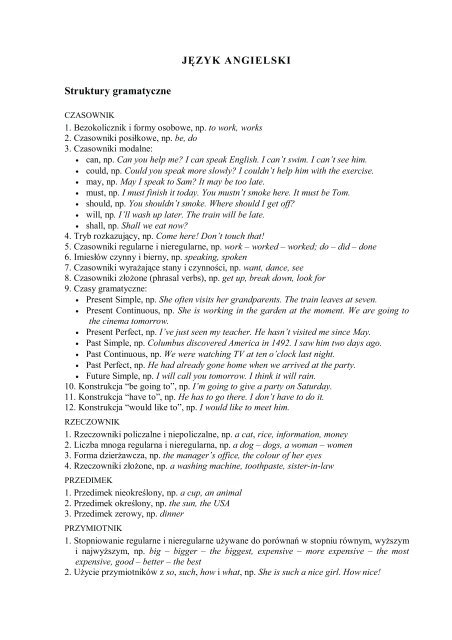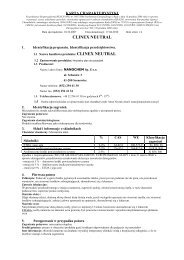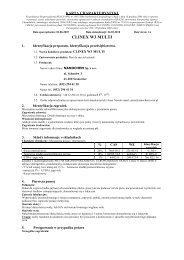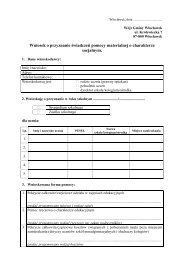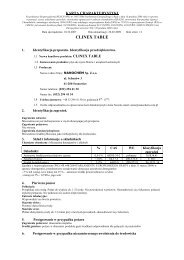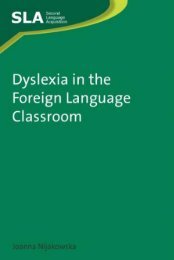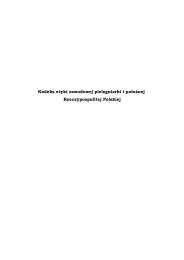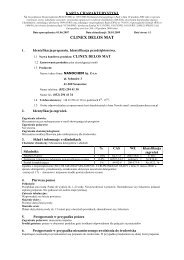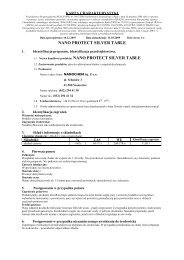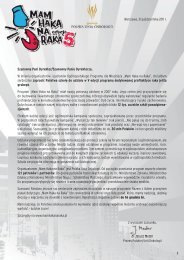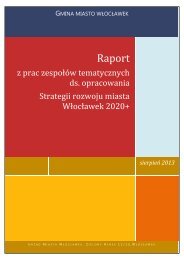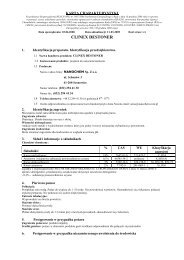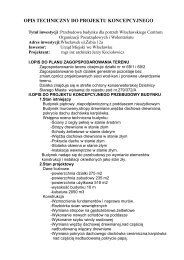Zadania sprawdzajÄ ce wiadomoÅci i umiejÄtnoÅci w zakresie ...
Zadania sprawdzajÄ ce wiadomoÅci i umiejÄtnoÅci w zakresie ...
Zadania sprawdzajÄ ce wiadomoÅci i umiejÄtnoÅci w zakresie ...
Create successful ePaper yourself
Turn your PDF publications into a flip-book with our unique Google optimized e-Paper software.
JĘZYK ANGIELSKI<br />
Struktury gramatyczne<br />
CZASOWNIK<br />
1. Bezokolicznik i formy osobowe, np. to work, works<br />
2. Czasowniki posiłkowe, np. be, do<br />
3. Czasowniki modalne:<br />
• can, np. Can you help me? I can speak English. I can’t swim. I can’t see him.<br />
• could, np. Could you speak more slowly? I couldn’t help him with the exercise.<br />
• may, np. May I speak to Sam? It may be too late.<br />
• must, np. I must finish it today. You mustn’t smoke here. It must be Tom.<br />
• should, np. You shouldn’t smoke. Where should I get off?<br />
• will, np. I’ll wash up later. The train will be late.<br />
• shall, np. Shall we eat now?<br />
4. Tryb rozkazujący, np. Come here! Don’t touch that!<br />
5. Czasowniki regularne i nieregularne, np. work – worked – worked; do – did – done<br />
6. Imiesłów czynny i bierny, np. speaking, spoken<br />
7. Czasowniki wyrażające stany i czynności, np. want, dance, see<br />
8. Czasowniki złożone (phrasal verbs), np. get up, break down, look for<br />
9. Czasy gramatyczne:<br />
• Present Simple, np. She often visits her grandparents. The train leaves at seven.<br />
• Present Continuous, np. She is working in the garden at the moment. We are going to<br />
the cinema tomorrow.<br />
• Present Perfect, np. I’ve just seen my teacher. He hasn’t visited me since May.<br />
• Past Simple, np. Columbus discovered America in 1492. I saw him two days ago.<br />
• Past Continuous, np. We were watching TV at ten o’clock last night.<br />
• Past Perfect, np. He had already gone home when we arrived at the party.<br />
• Future Simple, np. I will call you tomorrow. I think it will rain.<br />
10. Konstrukcja “be going to”, np. I’m going to give a party on Saturday.<br />
11. Konstrukcja “have to”, np. He has to go there. I don’t have to do it.<br />
12. Konstrukcja “would like to”, np. I would like to meet him.<br />
RZECZOWNIK<br />
1. Rzeczowniki policzalne i niepoliczalne, np. a cat, rice, information, money<br />
2. Liczba mnoga regularna i nieregularna, np. a dog – dogs, a woman – women<br />
3. Forma dzierżawcza, np. the manager’s office, the colour of her eyes<br />
4. Rzeczowniki złożone, np. a washing machine, toothpaste, sister-in-law<br />
PRZEDIMEK<br />
1. Przedimek nieokreślony, np. a cup, an animal<br />
2. Przedimek określony, np. the sun, the USA<br />
3. Przedimek zerowy, np. dinner<br />
PRZYMIOTNIK<br />
1. Stopniowanie regularne i nieregularne używane do porównań w stopniu równym, wyższym<br />
i najwyższym, np. big – bigger – the biggest, expensive – more expensive – the most<br />
expensive, good – better – the best<br />
2. Użycie przymiotników z so, such, how i what, np. She is such a nice girl. How nice!


